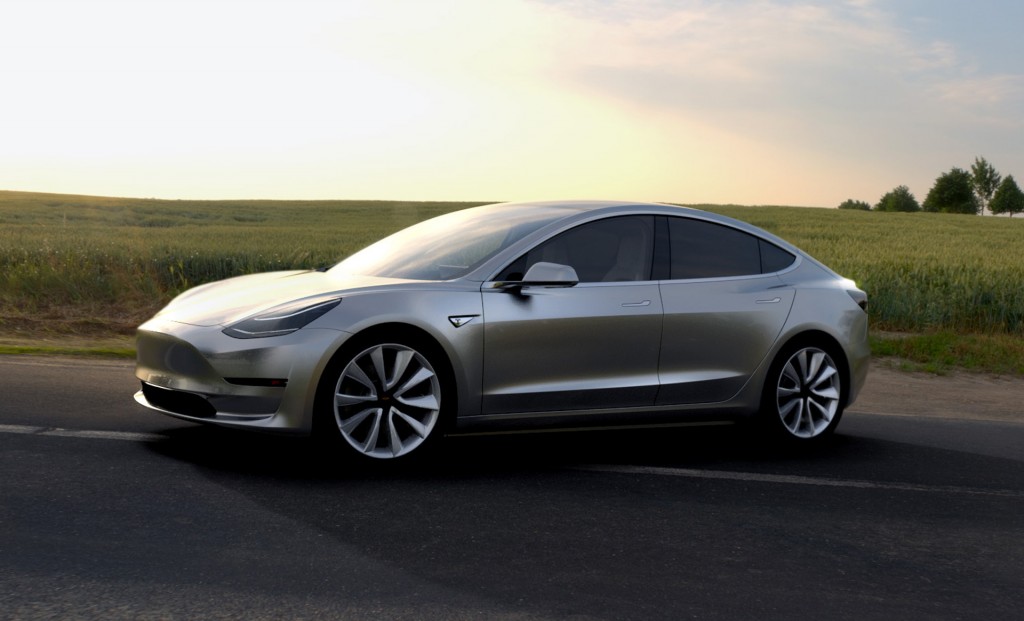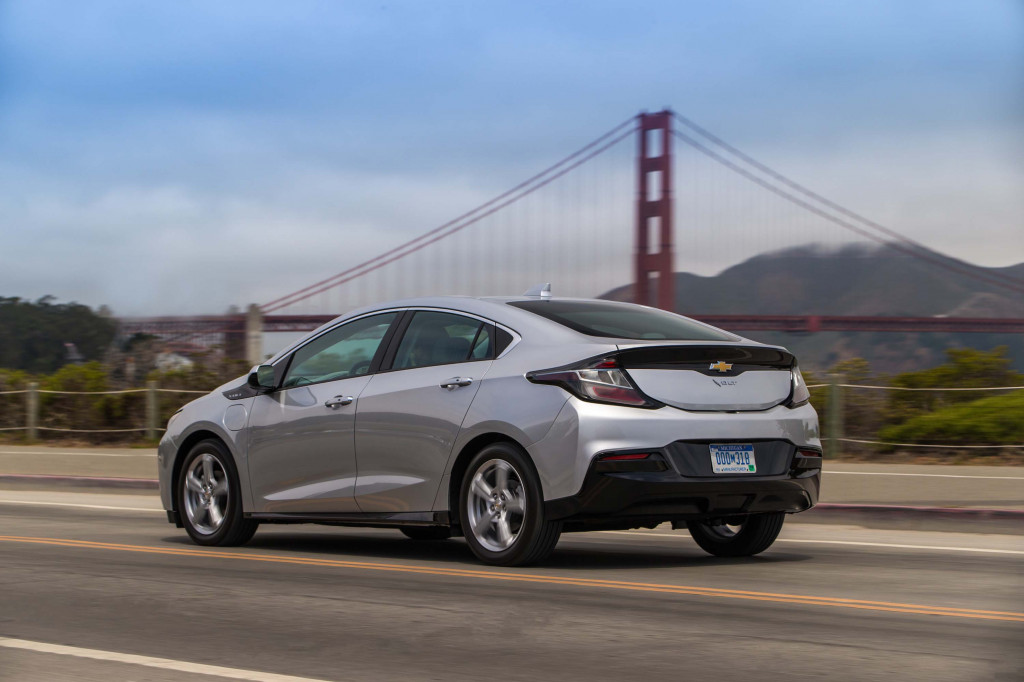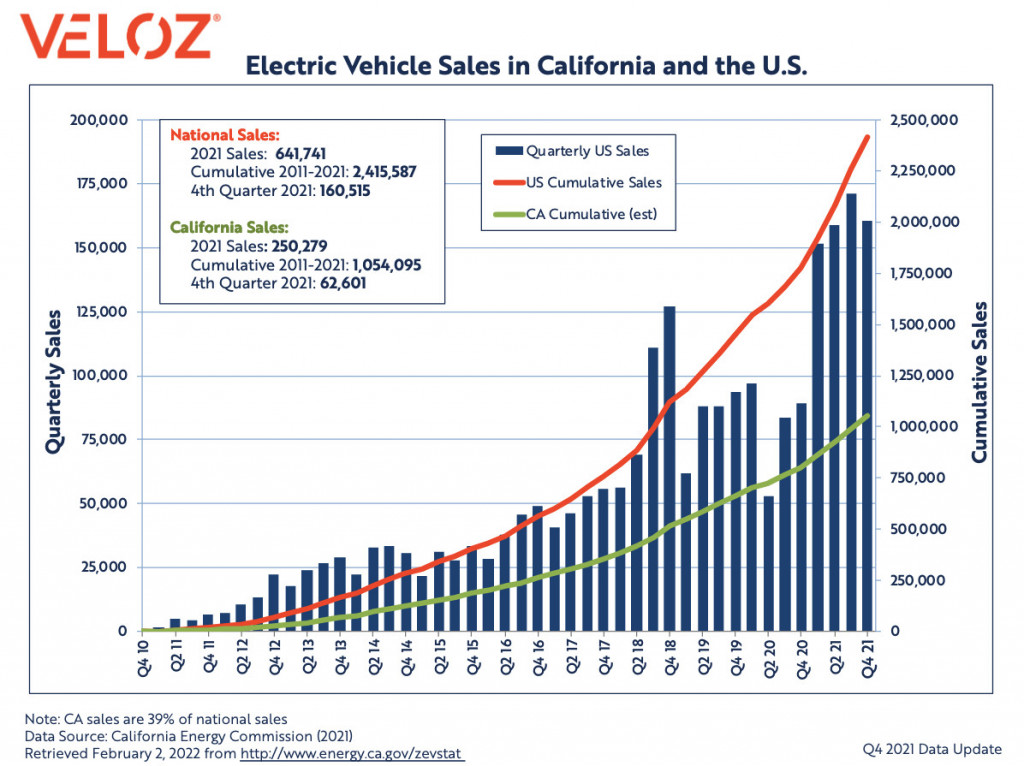California drivers have now bought a cumulative one million plug-in vehicles, according to data recently posted by the California Energy Commission.
The updated figures were heralded Friday by the EV advocacy group Veloz, celebrating Californians’ milestone of “1 million electric vehicles (EVs) sold”—the first state to reach this total.
But it’s not quite a million yet if you’re thinking of vehicles without fuel tanks and tailpipes. The running total of 1.054 million vehicles includes 379,000 plug-in hybrids that may be used in their electric modes to varied degrees, as well as nearly 12,000 fuel-cell vehicles.
As such, Californians had bought a cumulative 663,014 battery electric vehicles through the end of 2021—including 183,933 sales during the year.
EV sales in CA and the U.S. – Veloz (EV here means BEV+PHEV+FCEV)
For 2021, that puts battery electric vehicles plus plug-in hybrids at a 12.4% market share in California. And the sustained rise in market share through 2020 and 2021 is even steeper than market-share gains from 2017 to 2018, when the popular Tesla Model 3 arrived en masse.
The updated data confirms the Model 3 as the best-selling EV in the state in 2021, at 67,262 sales, while the Model Y is already close behind at 61,022. The Chevrolet Bolt EV was a distant third, at 12,313, despite a fire-risk battery recall that left it effectively off the market for a large chunk of the year.

Tesla Model 3
That correlates with data from the California New Car Dealers Association released earlier this month, showing that Tesla surged to a 10.5% market share in California in the fourth quarter of the year and managed a 6.5% market share for all of 2021 in the state.
California figured out exactly who that millionth owner was, and conveniently it was not the buyer of a plug-in hybrid. “Michael from Stockton” bought a Volkswagen ID.4, stacking rebates and tax credits to more than a $20,000 discount versus the electric SUV’s sticker price, according to a video from Governor Gavin Newsom’s office (below).
Meet Michael from Stockton – owner of the one-millionth EV sold in CA! He stacked rebates & tax credits for over $20k in savings to purchase his @VW.
California’s ZEV market is leading the nation in every category, including supporting low-income EV purchasers. pic.twitter.com/ipFsJ2Jpnk
— Office of the Governor of California (@CAgovernor) February 25, 2022
Veloz, however, suggests that there’s a lot of work to be done. It points to an International Energy Agency report from earlier in the year, noting that global EV market share jumped from 4.11% in 2020 to 8.57% in 2021—and effectively California hasn’t kept up with growth in Europe, where EV sales used to trail the state but now exceed 20%.
The state is targeting 5 million EVs sold by 2030, and it took more than a decade to get to 1 million. With mainstream marketing attention, a corresponding federal push, robust incentives, and a bullish approach to EV infrastructure, it might just get there.

2019 Chevrolet Volt
As of the end of 2021, cumulative U.S. plug-in vehicle sales were nearing 2.5 million—a figure that has likely been surpassed by now. In California and the U.S., the tally essentially started in late 2010 with the delivery of the first two mass-market plug-in vehicles, the Nissan Leaf and Chevrolet Volt.

I learned a lot from this article. Keep up the great work!
buy generic lasuna – diarex online order buy generic himcolin for sale
besivance online order – order carbocysteine for sale buy generic sildamax over the counter
cheap gabapentin pills – azulfidine 500 mg cost sulfasalazine 500mg tablet
buy benemid 500mg – purchase monograph cost tegretol 400mg
cost celecoxib – flavoxate tablets buy generic indocin online
where can i buy colospa – cilostazol 100mg price buy pletal no prescription
diclofenac 50mg tablet – order voltaren 100mg pill aspirin 75 mg pill
order rumalaya pill – shallaki for sale online endep pill
purchase pyridostigmine – pyridostigmine 60mg cost brand imuran 25mg
buy voveran generic – nimodipine order online buy cheap nimotop
where to buy ozobax without a prescription – order piroxicam 20 mg pills piroxicam 20 mg pills
cheap mobic 7.5mg – rizatriptan 5mg generic ketorolac usa
buy periactin sale – buy tizanidine sale tizanidine online order
where to buy artane without a prescription – buy voltaren gel sale purchase emulgel sale
cefdinir medication – buy cefdinir cheap order cleocin generic
accutane 20mg pill – order generic aczone buy deltasone 5mg pills
buy prednisone 10mg pills – permethrin cream purchase elimite online cheap
acticin cream – oral tretinoin where to buy retin without a prescription
betamethasone tubes – monobenzone drug order generic benoquin
flagyl online order – purchase flagyl for sale cenforce pills
order augmentin 375mg generic – order synthroid 150mcg online cheap synthroid for sale
cleocin ca – indocin 75mg for sale buy indocin 75mg online
buy cozaar sale – order cephalexin 500mg cephalexin 125mg uk
buy eurax without a prescription – mupirocin order online order generic aczone
order modafinil without prescription – melatonin 3mg uk meloset 3mg for sale
buy zyban generic – buy generic xenical over the counter purchase shuddha guggulu sale
xeloda 500mg without prescription – naproxen pills order danazol generic
order prometrium generic – buy ponstel for sale where can i buy fertomid
norethindrone sale – yasmin tablet purchase yasmin generic
バイアグラ通販で買えますか – г‚їгѓЂгѓ©гѓ•г‚Јгѓ« еЂ¤ж®µ г‚їгѓЂгѓ©гѓ•г‚Јгѓ« йЈІгЃїж–№